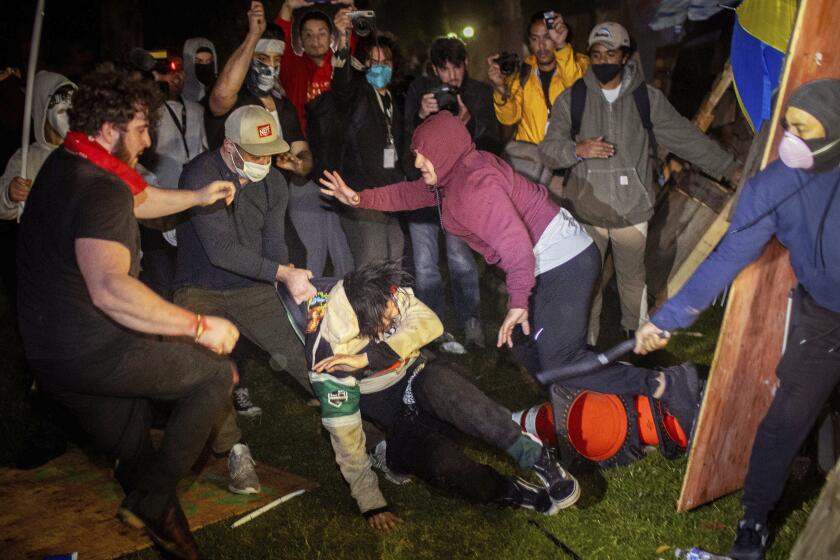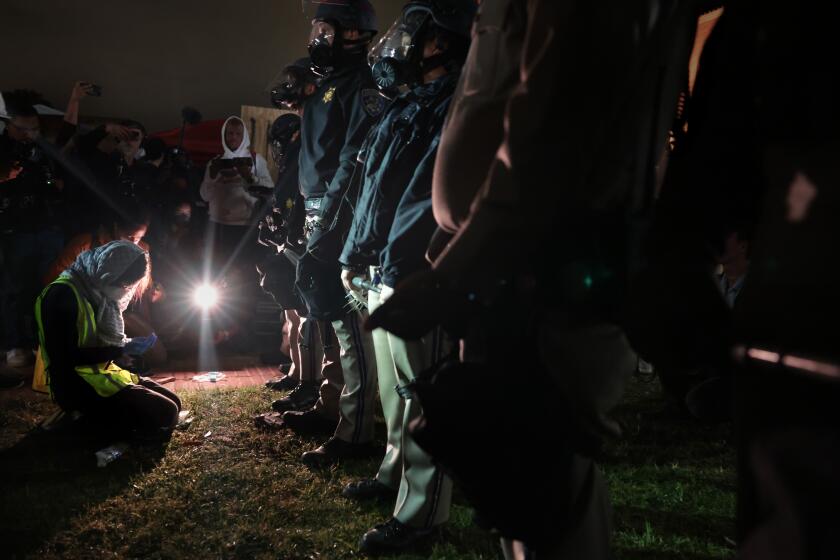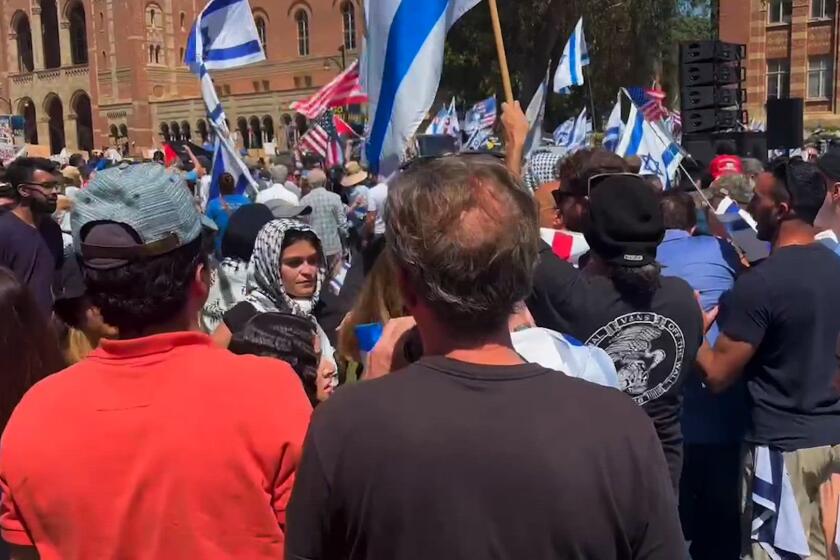Four UCLA student journalists attacked by pro-Israel counterprotesters on campus

Four student journalists who work for the UCLA Daily Bruin were attacked shortly before 3:30 a.m. Wednesday by pro-Israel counterprotesters during a campus demonstration that turned violent.
Daily Bruin news editor Catherine Hamilton, 21, told The Times she recognized one of the counterprotesters as someone who had previously verbally harassed her and taken pictures of her press badge. The individual instructed the group to encircle the student journalists, she said, before they sprayed the four with Mace or pepper spray, flashed lights in their faces and chanted Hamilton’s name.
As she tried to break free, Hamilton said, she was punched repeatedly in the chest and upper abdomen; another student journalist was pushed to the ground and beaten and kicked for nearly a minute. The attack was first reported in the Daily Bruin.
“We expected to be harassed by counterprotesters,” Hamilton said in an interview Wednesday, adding that every Daily Bruin reporter was instructed to use a buddy system, to report from outside the encampment and to leave the area if it became unsafe. “I truly did not expect to be directly assaulted.”
One of the other student reporters who was attacked, Shaanth Kodialam, said they watched their friend get pummeled to the ground and begged for the counterprotesters to stop.
It took hours for police to push away counterprotesters and bring calm to UCLA’s campus, raising questions about whether the campus was prepared.
“It’s not easy to do that job. It’s not easy to cover this event,” Kodialam, 21, said Wednesday, recalling how their eyes burned from the spray. “At the end of the day, we’re all trying our best to serve our campus community and make sure our students, our faculty, our staff get the information they need.”
The incident lasted about five minutes. The group of four made their way to the Daily Bruin newsroom before Hamilton went to the hospital, accompanied by her editor in chief, when the bruising made it difficult for her to stand and breathe. She has since been released.
As pro-Palestinian protests grow at California colleges and universities, counterprotesters spark clashes at UCLA.
The attack is one of several recent incidents involving journalists. It also is one of the first known attacks involving student reporters covering the ongoing unrest on campuses over the Israel-Hamas war, often when outside news media have been prevented from entering universities.
Hamilton, who has been a reporter for three years, said she believed her identity as a journalist would have prevented her from being assaulted. Instead, she said, it made her a target.
Many on campus and outside UCLA are criticizing the university for not handling the violent counterprotest better.
“I have never feared for my safety or the safety of my fellow Daily Bruin staffers” until last night, she said. “I was on edge the entire time looking for the three others who were with me to make sure that they were safe. Because I could not trust that they would be.”
Aggression against journalists at protests and demonstrations has steadily escalated over the last 20 years “in the age of internet surveillance and photographic capture,” said Steve Wasserman, the publisher of the Berkeley-based nonprofit Heyday Books.
Wasserman was arrested at UC Berkeley during an anti-Vietnam War demonstration when he was a student in 1970. He said a major difference between now and then is that the press was previously viewed with more neutrality.
“The press was largely regarded as a neutral arbiter ... and could be useful in spreading the word of the causes around which the protest occurred,” he said.
Now, a growing mistrust of the media has all but normalized the current aggressive treatment.
Clayton Weimers, executive director of Reporters Without Borders, USA, said the recent threats against journalists are reminiscent of the summer of 2020, when violence erupted at protests over the police murder of George Floyd.
“I am hopeful that we are not going back down that same path,” Weimers said.
A record number of arrests of journalists and attacks against the press occurred during that period four years ago, according to the U.S. Press Freedom Tracker.
Pro-Israel and pro-Palestinian demonstrators clash Sunday at UCLA, one day after protests erupted again at USC, where 93 people were arrested last week.
“It’s imperative that both [professional] journalists and student journalists who are covering their communities are able to do their jobs without fear of assault,” said Katherine Jacobsen, U.S., Canada and Caribbean program coordinator for the Committee to Protect Journalists. “It’s also really important that law enforcement and school administrations across the United States provide conditions in which the student journalists and other journalists can do their jobs without having to worry about being assaulted.”
It took hours for police to push away counterprotesters and bring calm to UCLA’s campus, raising questions about whether the campus was prepared.
University of California President Michael V. Drake said Wednesday that he had ordered an independent review of the university’s actions and law enforcement’s response to the violence.
The Daily Bruin, which said its site was down intermittently Wednesday due to a surge in traffic, previously reported that a building designated as an area for student reporters to seek safety was locked when reporters tried to access it. UCLA did not directly respond to questions emailed by The Times about that claim.
“I want to express my sincere sympathy to those who were injured last night, and to all those who have been harmed or have feared for their safety in recent days,” UCLA Chancellor Gene Block said in a statement. “We are still gathering information about the attack on the encampment last night, and I can assure you that we will conduct a thorough investigation that may lead to arrests, expulsions and dismissals.”
Hamilton, a junior, is one of two students who have spearheaded the Daily Bruin’s coverage of the reaction to the Israel-Hamas war, which began Oct. 7 when Hamas-led militants attacked Israel, killing an estimated 1,200 people and taking about 240 hostages. According to the Hamas-run Health Ministry in Gaza, an estimated 34,000 Palestinians have been killed in Israeli retaliatory attacks in the Gaza Strip.
Despite what happened, Hamilton said, she will continue to cover the campus unrest. And Kodialam, also a junior, continued their coverage Wednesday afternoon.
“I can’t sit back while I watch my friends, my peers, the people who have trained me, the people who I have trained, be hurt that way and allow myself to not continue to do my job,” they said.
More to Read
Sign up for Essential California
The most important California stories and recommendations in your inbox every morning.
You may occasionally receive promotional content from the Los Angeles Times.














